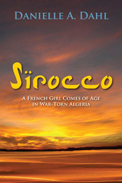
 |
This title of this well-crafted book refers to the powerful, hurricane-force sirocco winds that well up from the Sahara and sweep through northern Africa into the Mediterranean. Likewise, winds of political, social, and familial change blow through this memoir of growing up during the Algerian war of independence from France. The French had colonized Algeria since the 1830s, and the colonists who emigrated there eventually formed twenty percent of the population. Dahl’s family had lived in Algeria for four generations, but were caught in the crossfire when war broke out in 1954. The memoir is narrated by “Nanna,” ten years old when the war began. She documents her world through 1962 when Algeria gained independence. The oldest of five children, Nanna goes on a typical coming-of-age journey: navigating family life (in particular, dealing with an overbearing father), school, interests, friends, romance. But layered over this journey are violent attacks and the inevitability of having to flee a homeland that is fast becoming no longer a home.
Like The Kite Runner, this memoir eschews broad political statements. Instead, it focuses on the intimate, granular details of family life in a war zone. With prose that at times approaches poetry in its intimacy and rhythm, Dahl skillfully narrates the family’s domestic struggles and Nanna’s evolving perceptions of her dangerous environment. So skillful is the storytelling that the book could read as a novel were photographs of the characters not sprinkled strategically throughout. Although not a primer on this period of colonial history, the book nevertheless frames its narrative with context, motivating further study into this lesser-known historical moment. In the end, Dahl’s story shows the duality of the violent changes represented by the sirocco winds: massive, stretching across miles, but also felt on the faces and backs of those caught in them.
A 2020 Eric Hoffer Book Award Grand Prize Short List honoree
RECOMMENDED by the US Review